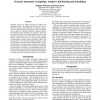Free Online Productivity Tools
i2Speak
i2Symbol
i2OCR
iTex2Img
iWeb2Print
iWeb2Shot
i2Type
iPdf2Split
iPdf2Merge
i2Bopomofo
i2Arabic
i2Style
i2Image
i2PDF
iLatex2Rtf
Sci2ools
AAAI
2004
2004
Towards Autonomic Computing: Adaptive Job Routing and Scheduling
Computer systems are rapidly becoming so complex that maintaining them with human support staffs will be prohibitively expensive and inefficient. In response, visionaries have begun proposing that computer systems be imbued with the ability to configure themselves, diagnose failures, and ultimately repair themselves in response to these failures. However, despite convincing arguments that such a shift would be desirable, as of yet there has been little concrete progress made towards this goal. We view these problems as fundamentally machine learning challenges. Hence, this article presents a new network simulator designed to study the application of machine learning methods from a systemwide perspective. We also introduce learning-based methods for addressing the problems of job routing and scheduling in the networks we simulate. Our experimental results verify that methods using machine learning outperform heuristic and hand-coded approaches on an example network designed to capture ...
AAAI 2004 | Computer Systems | Intelligent Agents | Machine Learning | Machine Learning Challenges |
Related Content
| Added | 30 Oct 2010 |
| Updated | 30 Oct 2010 |
| Type | Conference |
| Year | 2004 |
| Where | AAAI |
| Authors | Shimon Whiteson, Peter Stone |
Comments (0)

